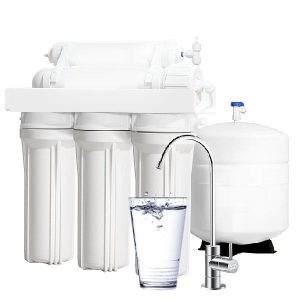Does Reverse Osmosis Remove Fluoride?
In an RO water filter, water passes through a series of reverse osmosis membranes at high pressure. As a result, the clean drinking water molecules get across the semi-permeable membrane, leaving behind many contaminants, including fluoride and other harmful ions.
In this way, the RO system successfully removes this ion from fluoridated water and produces great-tasting water without any impurities.
The Impact Of Fluoride On Our Body
Fluoride is an ion of the element fluorine. It breaks quickly in water, has no taste or odor, and is invisible once in liquid. Fluoride is safe to consume in small amounts, such as in fluoridated tap water, but it can be deadly in large quantities.
Now the question arises, how much fluoride is standard to prevent tooth decay? According to the US Department of Health and Human Services (HHS), 0.7 mg fluoride per liter of water is excellent for healthier teeth.
If excessive amounts of fluoride are present in a water supply intended for consumption, the water must be processed to eliminate the fluoride.
Excessive fluoride in water can result in:
- Dental Fluorosis
- Skeletal Fluorosis
- Calcification of Pineal gland
- Neurotoxicity (decreased IQ, slower responses, ADHD)
If there is only 0.7 mg of fluoride in our water supply, then why do we need water filtration systems for removing fluoride? The reason is we are already getting enough fluoride from other sources, including our toothpaste, mouthwashes, and other lozenges.
This intake of fluoride from other sources eliminates the need for water fluoridation. That is why we need these reverse osmosis water filters to remove fluoride and other common contaminants from water.

How Does Reverse Osmosis Remove Fluoride?
Reverse osmosis filtration is one of the most efficient ways to remove contaminants from water.
Reverse osmosis works on a principle opposite to osmosis.
In osmosis, the solute itself moves (without any pressure or external force) across a semi-permeable membrane to achieve balance. In a reverse osmosis water filter, a liquid is forcibly passed through a semi-permeable membrane.
RO system features a reverse osmosis membrane in addition to a range of filters that catch pollutants bigger than water droplets in their holes. The size of pores in this filtration system is 0.0001 to 0.001 micrometers.
Water enters the reverse osmosis units at high pressure. It is pushed through a reverse osmosis filter while waste exits through the drainpipe. Fluoride ions are too big to travel through the membrane. Therefore they, together with the bulk of other pollutants, get stuck in the water filter.
On the other end of the RO system, you get pure water that is free of impurities.
What Amount of Fluoride Does Reverse Osmosis Remove?
The answer is dependent on the membrane’s quality. However, RO is a robust fluorine filtration system for water on average. Some research sheets show that fluoride water filters can remove about 80 to 90 percent of fluoride from tap water.
This is about as excellent as any filtering system can go, which is why reverse osmosis filters are such a common choice for people wanting to eliminate fluoride particularly.
It is not as expensive as some other filters out there in the business, and it can do the job quite perfectly.
Which Other Pollutants Does Reverse Osmosis Remove?
Reverse osmosis filtration not only eliminates fluoride from your water but also removes a wide range of contaminants. They can eliminate up to 95% of all inorganic pollutants present in the tap water, including:
- Chlorine and chloramines
- Heavy metals such as lead, Arsenic, etc
- Pesticides and herbicides
- Chemicals such as chlorine
- Minerals like calcium and magnesium.
During water flow from supply lines, water catches some dust particles and some other solid materials. RO does a great job of removing all of them with excellent efficiency and make your drinking water healthy and safe.
Furthermore, a reverse osmosis filter removes up to 99 percent of organic material, including bacteria and viruses. Thus, it allows you to use most reverse osmosis systems with both clean and dirty water, such as well water and municipal water.
Do All Reverse Osmosis Filters Remove Fluoride?
NOT ALL reverse osmosis filters can remove fluoride. Some filters can completely remove fluoride, while others will leave some fluoride in the processed water.
It depends on various factors such that:
- Quality of filter
- Pore size
- Configuration of the filter
- Speed of filtration
- Efficacy of filter
In some filters, the reverse osmosis membrane’s pores are too large to collect and eliminate fluoride effectively. So, if you want to buy a fluoride water filter, make sure that it is tried and tested.
Problems With Reverse Osmosis System
It is undoubtedly true that reverse osmosis systems help you a lot in your daily life. But just like all other systems on the planet, it also has some cons, which are as follow:
Wastage of Water
Traditional reverse osmosis systems have several drawbacks, including the problem that they use a lot of water to function, consuming more water than required during the filtering process.
Utilities must waste as little water as possible and handle it effectively when water is becoming an extremely critical resource to maintain purity and save.
Removal of Good Minerals
Some people are also concerned that the reverse osmosis method is so successful at eliminating pollutants; it can also eliminate nutrients and minerals that are beneficial to human health, like as calcium and magnesium.
Other Water Filters That Remove Fluoride
A reverse osmosis system is an effective way to remove fluoride. But, it is not the only option for you. Some of the fluoride removal filters are as below:
Activated Alumina Filters
Many filters include active carbon cartridges that operate uniquely than reverse osmosis. The filters activated alumina particles remove all pollutants like fluoride and excessive magnesium and give drinking water up to 97 percent pure.
De-Ionizing Filters
Deionization is a comparable procedure to distilling in that it takes the same amount of time to complete. It simply eliminates all ionic particles from the water and thoroughly removes fluoride.
However, these filters are costly, and they need regular cartridge changes as well as a high level of upkeep. Non-ionic water pollutants are still present in the water and are not being treated.
Whole House Filters
Whole-house filtration solutions are meant to deliver safe drinking water, particularly from boreholes with high iron and organic carbon levels.
Fluoride is in the same range, and whole-house filters efficiently eliminate it from the water, leaving it safe to drink. With up to eight cartridge settings, whole house filters function quicker and can handle heavier loads.
Conclusion
Finding a reverse osmosis system on the market is not hard if you have done proper research. Just make sure that the Reverse osmosis system comes with an extended warranty so you can claim it just in case it malfunctions.
To conclude, does reverse osmosis remove fluoride? Yes, it does. To enhance your water quality, install an RO system under your kitchen sink to get an unlimited supply of filtered water.
We have tried to clear all of the confusion regarding a reverse osmosis filter. We sincerely hope you enjoyed every minute you spent with us.
